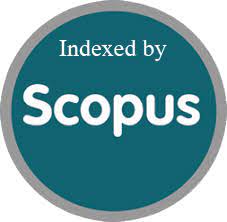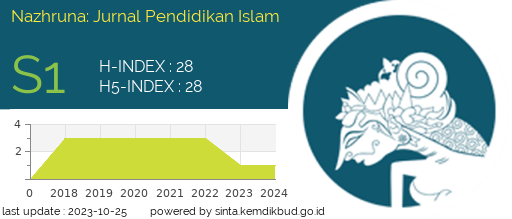Islamic Education and Character Building in The 4.0 Industrial Revolution
Abstract
This article describes the concept of Islamic education, in which case the emphasis is on the implementation of Islamic religious education. The implementation of Islamic religious education itself is an effort to instill the values of Islamic aqeedah to every student as an effort to create a generation of Muslims who can and are able to live and believe in every truth in the teachings of Islam itself. This article uses a literature review method with content analysis design. Students are willing to practice the values of Islamic teachings at any time, whenever, and wherever the teachings of Islam want to be conveyed are the problems of Islamic education should not be taken for granted so that Islamic education can compete and become educational goals that are achieved. The application of Islamic education in the industrial revolution 4.0 era is very important in developing the quality of children's potential, both in mastering science and technology as well as in terms of character, attitude and appreciation, and practice of religious teachings.
Downloads
References
Aisyah, Siti, Munaya Ulil Ilmi, Muhammad Amirudin Rosyid, Eni Wulandari, and Fandi Akhmad. “Kiai Leadership Concept in The Scope of Pesantren Organizational Culture.” Tafkir: Interdisciplinary Journal of Islamic Education 3, no. 1 (January 29, 2022): 40–59. https://doi.org/10.31538/tijie.v3i1.106.
Asfiati. Redesign Pembelajaran Pendidikan Agama Islam Menuju Revolusi Industri 4.0. Jakarta: Prenada Media: Kencana, 2020.
Azis, Abdul, Reem Abou-Samra, and Andika Aprilianto. “Online Assessment of Islamic Religious Education Learning.” Tafkir: Interdisciplinary Journal of Islamic Education 3, no. 1 (January 29, 2022): 60–76. https://doi.org/10.31538/tijie.v3i1.114.
Choli, Ifham. “Pendidikan Agama Islam Dan Industri 4.0.” Tahdzib Al-Akhlaq: Jurnal Pendidikan Islam 3, no. 2 (July 14, 2020): 20–40. https://doi.org/10.34005/tahdzib.v3i2.891.
Ciptaningsih, Yeni, and Muhammad Husnur Rofiq. “Participatory Learning With Game Method For Learning Completeness In Islamic Religious Education.” Fikroh: Jurnal Pemikiran Dan Pendidikan Islam 15, no. 1 (January 29, 2022): 18–29. https://doi.org/10.37812/fikroh.v15i1.361.
Dimas, Indianto. “Pendidikan Agama Islam Dalam Revolusi Industri 4.0.” PROSIDING SEMINAR NASIONAL PRODI PAI UMP, 2019. http://digital.library.ump.ac.id/254/.
Fr, Ashdaq Fillah, Erny Roesminingsih, and Meini Sondang Sumbawati. “The Leadership of School Principal in The Education Era 4.0.” Nidhomul Haq : Jurnal Manajemen Pendidikan Islam 6, no. 2 (July 22, 2021): 244–50. https://doi.org/10.31538/ndh.v6i2.1413.
Fuadi, Akhsanul, and Suyatno Suyatno. “Integration of Nationalistic and Religious Values in Islamic Education: Study in Integrated Islamic School.” Randwick International of Social Science Journal 1, no. 3 (October 23, 2020): 555–70. https://doi.org/10.47175/rissj.v1i3.108.
Haidir, Haidir, Muhammad Arizki, and Miftah Fariz. “An Innovation of Islamic Religious Education in The Era of The Industrial Revolution 4.0 in Elementary School.” Nazhruna: Jurnal Pendidikan Islam 4, no. 3 (November 9, 2021): 720–34. https://doi.org/10.31538/nzh.v4i3.1688.
Ismail, Shalahudin, Ma’mun Zahrudin, Uus Ruswandi, and Erihadiana Erihadiana. “The Competence of Millennial Islamic Education Teachers in Facing The Challenges of Industrial Revolution.” Nazhruna: Jurnal Pendidikan Islam 3, no. 3 (November 4, 2020): 389–405. https://doi.org/10.31538/nzh.v3i3.823.
Jemani, Abdurahman, and M. Afif Zamroni. “Tantangan Pendiddikan Islam Di Era Revolusi Industri 4.0.” Attaqwa: Jurnal Ilmu Pendidikan Islam 16, no. 2 (August 3, 2020): 126–40. https://doi.org/10.54069/attaqwa.v16i2.55.
Kahar, M. Iksan, Hairuddin Cika, Nur Afni, and Nur Eka Wahyuningsih. “Pendidikan Era Revolusi Industri 4.0 Menuju Era Society 5.0 Di Masa Pandemi Covid 19.” Moderasi: Jurnal Studi Ilmu Pengetahuan Sosial 2, no. 1 (September 24, 2021): 58–78. https://doi.org/10.24239/moderasi.Vol2.Iss1.40.
Kango, Umin, Ari Kartiko, and Muhammad Anas Maarif. “The Effect of Promotion on the Decision to Choose a Higher Education through the Brand Image of Education.” AL-ISHLAH: Jurnal Pendidikan 13, no. 3 (October 26, 2021): 1611–21. https://doi.org/10.35445/alishlah.v13i3.852.
Kim, Jinyoung. “Learning and Teaching Online During Covid-19: Experiences of Student Teachers in an Early Childhood Education Practicum.” International Journal of Early Childhood 52, no. 2 (August 1, 2020): 145–58. https://doi.org/10.1007/s13158-020-00272-6.
Kresnoadi. “Sejarah Revolusi Industri 4.0 Dan Bedanya Dengan Society 5.0.” BINUS Online Learning (blog), May 23, 2021. http://onlinelearning.binus.ac.id/2021/05/23/sejarah-revolusi-industri-4-0-dan-bedanya-dengan-society-5-0/.
Ma`arif, Muhammad Anas, and Ibnu Rusydi. “Implementasi Pendidikan Holistik Di Pondok Pesantren Amanatul Ummah Mojokerto.” EDUKASI: Jurnal Penelitian Pendidikan Agama Dan Keagamaan 18, no. 1 (April 27, 2020): 100–117. https://doi.org/10.32729/edukasi.v18i1.598.
Maulidyah, Riza Firly, and Agus Machfud Fauzi. “Multicultural Community Rationality in Running Religious Activities in Pandemic Times.” Al-Mada: Jurnal Agama, Sosial, Dan Budaya 4, no. 2 (November 1, 2021): 271–87. https://doi.org/10.31538/almada.v4i2.1653.
Mufidah, luluk Indarinul. “Analisis Pendidikan Nilai Islam Di Era Industri 4.0.” JURNAL LENTERA : Kajian Keagamaan, Keilmuan Dan Teknologi 17, no. 2 (2018): 179–90.
Muhamad Arif, Mulyadi. “Madrasah Ibtidaiyah Transformation Based on Pesantren in the Era of Industrial Revolution 4.0.” Psychology and Education Journal 57, no. 8 (2020): 420–35. https://doi.org/10.17762/pae.v57i8.759.
Muhammad, Devy Habibi. “Implementasi Pendidikan Humanisme Religiusitas Dalam Pendidikan Pendidikan Agama Islam Di Era Revolusi Industri 4.0.” Edumaspul: Jurnal Pendidikan 4, no. 2 (October 28, 2020): 122–31. https://doi.org/10.33487/edumaspul.v4i2.581.
Pangestu, Umigiarini, and Dedy Hermanto Karwan. “The Role of The Principal to Increase Teacher Innovation and Creativity during the Pandemic.” Nidhomul Haq : Jurnal Manajemen Pendidikan Islam 6, no. 2 (July 22, 2021): 251–66. https://doi.org/10.31538/ndh.v6i2.1432.
Priyanto, Adun. “Pendidikan Islam dalam Era Revolusi Industri 4.0.” J-PAI: Jurnal Pendidikan Agama Islam 6, no. 2 (June 12, 2020). https://doi.org/10.18860/jpai.v6i2.9072.
Rahmat, Rahmat. “Pendidikan Agama Islam Berwawasan Interdisipliner Sebagai Corak Dan Solusi Pendidikan Agama Islam Era 4.0.” Tribakti: Jurnal Pemikiran Keislaman 30, no. 2 (July 10, 2019): 349–61. https://doi.org/10.33367/tribakti.v30i2.821.
Rony, Rony, and Siti Ainun Jariyah. “Urgensi Pendidikan Karakter Dalam Membentuk Akhlak Peserta Didik.” Tafkir: Interdisciplinary Journal of Islamic Education 1, no. 1 (2020): 79–100. https://doi.org/10.31538/tijie.v1i1.18.
Sabri, Ahmad. Pendidikan Islam Menyongsong Era Industri 4.0. Deepublish (Grup Penerbitan CV BUDI UTAMA), 2020.
Sirojuddin, Akhmad, Andika Aprilianto, and Novela Elza Zahari. “Peran Kepala Sekolah Sebagai Supervisor Pendidikan Dalam Meningkatkan Profesionalisme Guru.” Chalim Journal of Teaching and Learning (CJoTL) 1, no. 2 (2021): 159–68.
Suharto. “Pendidikan Islam Di Era Revolusi Industri 4.0.” SALIHA: Jurnal Pendidikan & Agama Islam 2, no. 2 (2019). https://staitbiasjogja.ac.id/jurnal/index.php/saliha/article/view/33.
Surya, Prastio, and Muhammad Husnur Rofiq. “Internalisasi Nilai Karakter Jujur Dalam Proses Pembelajaran Di Kelas VIII Madrasah Tsanawiyah Unggulan Hikmatul Amanah Pacet Mojokerto.” Munaddhomah: Jurnal Manajemen Pendidikan Islam 2, no. 1 (August 4, 2021): 31–37. https://doi.org/10.31538/munaddhomah.v2i1.65.
Susetyo, Susetyo. “Inovasi Pembelajaran Di Era Revolusi Industri 4.0.” Prosiding Seminar Nasional PBSI UPY 2019 1, no. 1 (December 30, 2019): 1–9.
Tajudin, Ahmad, and Andika Aprilianto. “Strategi Kepala Madrasah..Dalam Membangun Budaya Religius Peserta Didik.” Munaddhomah: Jurnal Manajemen Pendidikan Islam 1, no. 2 (September 25, 2020): 101–10. https://doi.org/10.31538/munaddhomah.v1i2.34.
Copyright (c) 2022 Mohammad Adnan

This work is licensed under a Creative Commons Attribution-ShareAlike 4.0 International License.










1.jpg)


